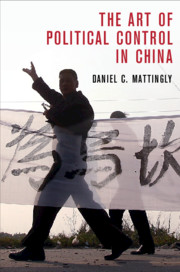Refine search
Actions for selected content:
8 results
Political responsiveness and centralized religious leaders: lessons from the Catholic Church
-
- Journal:
- Politics and Religion / Volume 17 / Issue 2 / June 2024
- Published online by Cambridge University Press:
- 27 May 2024, pp. 250-275
-
- Article
-
- You have access
- Open access
- HTML
- Export citation
6 - Infiltration
-
- Book:
- The Art of Political Control in China
- Published online:
- 18 November 2019
- Print publication:
- 05 December 2019, pp 154-180
-
- Chapter
- Export citation
7 - Conclusion
-
- Book:
- The Art of Political Control in China
- Published online:
- 18 November 2019
- Print publication:
- 05 December 2019, pp 181-192
-
- Chapter
- Export citation
5 - Co-optation
-
- Book:
- The Art of Political Control in China
- Published online:
- 18 November 2019
- Print publication:
- 05 December 2019, pp 120-153
-
- Chapter
- Export citation
1 - Introduction
-
- Book:
- The Art of Political Control in China
- Published online:
- 18 November 2019
- Print publication:
- 05 December 2019, pp 1-23
-
- Chapter
- Export citation
2 - A Theory of Political Control
-
- Book:
- The Art of Political Control in China
- Published online:
- 18 November 2019
- Print publication:
- 05 December 2019, pp 24-55
-
- Chapter
- Export citation
4 - Cultivating Civil Society
-
- Book:
- The Art of Political Control in China
- Published online:
- 18 November 2019
- Print publication:
- 05 December 2019, pp 87-119
-
- Chapter
- Export citation

The Art of Political Control in China
-
- Published online:
- 18 November 2019
- Print publication:
- 05 December 2019
